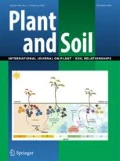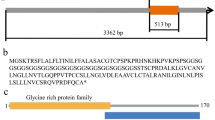Abstract
Purpose
Plant cell wall polysaccharide composition is closely related to the occurrence of aluminum (Al) toxicity and Al resistance. Glycosyltransferases participate in cell wall polysaccharide biosynthesis. Our previous microarray analysis showed that Al increased the transcriptional abundance of UDP-glycosyltransferase (UGT) in soybean (Glycine max). The present study aimed to clarify if GmUGTs are involved in modifying the composition of cell wall polysaccharides and then alter soybean Al sensitivity.
Methods
Two soybean genes, UGT85A111 and UGT83R1, were identified, and their functions were characterized by analyses of expression pattern and subcellular localization, and evaluations of carbohydrates in the cell wall and Al sensitivity by their overexpression in soybean hairy roots and Arabidopsis.
Results
The transcriptional expression of UGT85A111 and UGT83R1 was increased with different patterns and levels under Al stress. Both GmUGTs localized to the plasma membrane. UGT85A111-OE and UGT83R1-OE soybean hairy roots showed less Al absorption, which was accompanied by alterations in cell wall polysaccharide components, particularly reduced callose and/or hemicellulose contents. Monosaccharide content, including glucose and xylose in the GmUGTs-OE roots, was also affected. Heterologous expression of UGT85A111 and UGT83R1 significantly improved the plant’s Al resistance capacity.
Conclusion
GmUGTs contribute to the disruption of cell wall polysaccharide compositions and Al sensitivity in soybean. The results suggest a particularly protective role of UGTs against Al toxicity and may provide novel clues for plant Al stress adaptation.







Similar content being viewed by others
References
Bar-Peled M, O’Neill MA (2011) Plant nucleotide sugar formation, interconversion, and salvage by sugar recycling. Annu Rev Plant Biol 62:127–155. https://doi.org/10.1146/annurev-arplant-042110-103918
Blumenkrantz N, Asboe-Hansen G (1973) New method for quantitative determination of uronic acids. Anal Biochem 54:484–489. https://doi.org/10.1016/0003-2697(73)90377-1
Caffall KH, Mohnen D (2009) The structure, function, and biosynthesis of plant cell wall pectic polysaccharides. Carbohydr Res 344:1879–1900. https://doi.org/10.1016/j.carres.2009.05.021
Chang Y, Yamamoto Y, Matsumoto H (1999) Accumulation of aluminium in the cell wall pectin in cultured tobacco (Nicotiana tabacum L.) cells treated with a combination of aluminium and iron. Plant Cell Environ 76:10–23. https://doi.org/10.1046/j.1365-3040.1999.00467.x
Clough SJ, Bent AF (1998) Floral dip: a simplified method for Agrobacterium-mediated transformation of Arabidopsis thaliana. Plant J 16:735–743. https://doi.org/10.1046/j.1365-313x.1998.00343.x
Cosgrove DJ (1997) Assembly and enlargement of the primary cell wall in plants. Annu Rev Cell Dev Biol 13:171–201. https://doi.org/10.1146/annurev.cellbio.13.1.171
Delhaize E, Ryan PR, Randall PJ (1993) Aluminum tolerance in wheat (Triticum aestivum L.) (II. Aluminum-stimulated excretion of malic acid from root apices). Plant Physiol 103:695–702. https://doi.org/10.1104/pp.103.3.695
Dmitriev AA, Krasnov GS, Rozhmina TA, Kishlyan NV, Zyablitsin AV, Sadritdinova AF, Snezhkina AV, Fedorova MS, Yurkevich OY, Muravenko OV, Bolsheva NL, Kudryavtseva AV, Melnikova NV (2016) Glutathione S-transferases and UDP-glycosyltransferases are involved in response to aluminum stress in flax. Front Plant Sci 7:1920. https://doi.org/10.3389/fpls.2016.01920
Eticha D, Stass A, Horst WJ (2005) Cell-wall pectin and its degree of methylation in the maize root-apex: significance for genotypic differences in aluminium resistance. Plant Cell Environ 28:1410–1420. https://doi.org/10.1111/j.1365-3040.2005.01375.x
Gao J, Yan S, Yu H, Zhan M, Guan K, Wang Y, Yang Z (2019) Sweet sorghum (Sorghum bicolor L.) SbSTOP1 activates the transcription of a β-1,3-glucanase gene to reduce callose deposition under Al toxicity: a novel pathway for Al tolerance in plants. Biosci Biotechnol Biochem 83:446–455. https://doi.org/10.1080/09168451.2018.1540290
Gondolf VM, Stoppel R, Ebert B, Rautengarten C, Liwanag AJ, Loqué D, Scheller HV (2014) A gene stacking approach leads to engineered plants with highly increased galactan levels in Arabidopsis. BMC Plant Biol 14:344. https://doi.org/10.1186/s12870-014-0344-x
Hazen SP, Hawley RM, Davis GL, Henrissat B, Walton JD (2003) Quantitative trait loci and comparative genomics of cereal cell wall composition. Plant Physiol 132:263–271. https://doi.org/10.1104/pp.103.020016
Herridge DF, Peoples MB, Boddey RM (2008) Global inputs of biological nitrogen fixation in agricultural systems. Plant Soil 311:1–18. https://doi.org/10.1007/s11104-008-9668-3
Horst WJ, Asher CJ, Cakmak I, Szulkiewicz P, Wissemeier AH (1992) Short-term responses of soybean roots to aluminium. J Plant Physiol 140:174–178. https://doi.org/10.1016/S0176-1617(11)80930-2
Hou B, Lim EK, Higgins GS, Bowles DJ (2004) N-glucosylation of cytokinins by glycosyltransferases of Arabidopsis thaliana. J Biol Chem 279:47822–47832. https://doi.org/10.1074/jbc.M409569200
Huang CF, Yamaji N, Mitani N, Yano M, Nagamura Y, Ma JF (2009) A bacterial-type ABC transporter is involved in aluminum tolerance in rice. Plant Cell 21:655–667. https://doi.org/10.1105/tpc.108.064543
Keegstra K, Raikhel N (2001) Plant glycosyltransferases. Curr Opin Plant Biol 4:219–224. https://doi.org/10.1016/s1369-5266(00)00164-3
Kubo A, Arai Y, Nagashima S, Yoshikawa T (2004) Alteration of sugar donor specificities of plant glycosyltransferases by a single point mutation. Arch Biochem Biophys 429:198–203. https://doi.org/10.1016/j.abb.2004.06.021
Lairson LL, Henrissat B, Davies GJ, Withers SG (2008) Glycosyltransferases: structures, functions, and mechanisms. Annu Rev Biochem 77:521–555. https://doi.org/10.1146/annurev.biochem.76.061005.092322
Langlois-Meurinne M, Gachon CM, Saindrenan P (2005) Pathogen-responsive expression of glycosyltransferase genes UGT73B3 and UGT73B5 is necessary for resistance to Pseudomonas syringae pv tomato in Arabidopsis. Plant Physiol 139:1890–1901. https://doi.org/10.1104/pp.105.067223
Li Y, Baldauf S, Lim EK, Bowles DJ (2001) Phylogenetic analysis of the UDP-glycosyltransferase multigene family of Arabidopsis thaliana. J Biol Chem 276:4338–4343. https://doi.org/10.1074/jbc.M007447200
Li YJ, Wang B, Dong RR, Hou BK (2015) AtUGT76C2, an Arabidopsis cytokinin glycosyltransferase is involved in drought stress adaptation. Plant Sci 236:157–167. https://doi.org/10.1016/j.plantsci.2015.04.002
Li CX, Yan JY, Ren JY, Sun L, Xu C, Li GX, Ding ZJ, Zheng SJ (2020) A WRKY transcription factor confers aluminum tolerance via regulation of cell wall modifying genes. J Integr Plant Biol 62:1176–1192. https://doi.org/10.1111/jipb.12888
Livak KJ, Schmittgen TD (2001) Analysis of relative gene expression data using real-time quantitative PCR and the 2-ΔΔCT method. Methods 25:402–408
Louveau T, Osbourn A (2019) The sweet side of plant-specialized metabolism. Cold Spring Harb Perspect Biol 11:a034744. https://doi.org/10.1101/cshperspect.a034744
Mattiello L, Begcy K, da Silva FR, Jorge RA, Menossi M (2014) Transcriptome analysis highlights changes in the leaves of maize plants cultivated in acidic soil containing toxic levels of Al3+. Mol Biol Rep 41:8107–8116. https://doi.org/10.1007/s11033-014-3709-1
Rengel Z, Reid RJ (1997) Uptake of Al across the plasma membrane of plant cells. Plant Soil 192:31–35. https://doi.org/10.1023/a:1004265913770
Sivaguru M, Fujiwara T, Samaj J, Baluska F, Yang ZM, Osawa H, Maeda T, Mori T, Volkmann D, Matsumoto H (2000) Aluminum-induced 1 -> 3-beta-D-glucan inhibits cell-to-cell trafficking of molecules through plasmodesmata. A new mechanism of aluminum toxicity in plants. Plant Physiol 124:991–1005. https://doi.org/10.1104/pp.124.3.991
Subramanian S, Graham MY, Yu O, Graham TL (2005) RNA interference of soybean isoflavone synthase genes leads to silencing in tissues distal to the transformation site and to enhanced susceptibility to Phytophthora sojae. Plant Physiol 137:1345–1353. https://doi.org/10.1104/pp.104.057257
Sun YG, Wang B, Jin SH, Qu XX, Li YJ, Hou BK (2013) Ectopic expression of Arabidopsis glycosyltransferase UGT85A5 enhances salt stress tolerance in tobacco. PLoS ONE 8:e59924. https://doi.org/10.1371/journal.pone.0059924
Taylor GJ, McDonald-Stephens JL, Hunter DB, Bertsch PM, Elmore D, Rengel Z, Reid RJ (2000) Direct measurement of aluminum uptake and distribution in single cells of Chara corallina. Plant Physiol 123:987–996. https://doi.org/10.1104/pp.123.3.987
Teraoka T, Kaneko M, Mori S, Yoshimura E (2002) Aluminum rapidly inhibits cellulose synthesis in roots of barley and wheat seedlings. J Plant Physiol 159:17–23. https://doi.org/10.1078/0176-1617-00678
Tice KR, Parker DR, Demason DA (1992) Operationally defined apoplastic and symplastic aluminum fractions in root tips of aluminum-intoxicated wheat. Plant Physiol 100:309–318. https://doi.org/10.1104/pp.100.1.309
Van HL, Kuraishi S, Sakurai N (1994) Aluminum-induced rapid root inhibition and changes in cell-wall components of squash seedlings. Plant Physiol 106:971–976. https://doi.org/10.1104/pp.106.3.971
von Saint PV, Zhang W, Kanawati B, Geist B, Faus-Kessler T, Schmitt-Kopplin P, Schäffner AR (2011) The Arabidopsis glucosyltransferase UGT76B1 conjugates isoleucic acid and modulates plant defense and senescence. Plant Cell 23:4124–4145. https://doi.org/10.1105/tpc.111.088443
Xu JM, Lou HQ, Jin JF, Chen WW, Wan JX, Fan W, Yang JL (2018) A half-type ABC transporter FeSTAR1 regulates Al resistance possibly via UDP-glucose-based hemicellulose metabolism and Al binding. Plant Soil 432:303–314. https://doi.org/10.1007/s11104-018-3805-4
Yamaji N, Huang CF, Nagao S, Yano M, Sato Y, Nagamura Y, Ma FJ (2009) A zinc finger transcription factor ART1 regulates multiple genes implicated in aluminum tolerance in rice. Plant Cell 21:3339–3349. https://doi.org/10.1105/tpc.109.070771
Yang ZM, Sivaguru M, Horst WJ, Matsumoto H (2000) Aluminium tolerance is achieved by exudation of citric acid from roots of soybean (Glycine max). Physiol Plant 110:72–77. https://doi.org/10.1034/j.1399-3054.2000.110110.x
Yang JL, Li YY, Zhang YJ, Zhang SS, Wu YR, Wu P, Zheng SJ (2008) Cell wall polysaccharides are specifically involved in the exclusion of aluminum from the rice root apex. Plant Physiol 146:602–611. https://doi.org/10.1104/pp.107.111989
Yang JL, Zhu XF, Peng YX, Zheng C, Li GX, Liu Y, Shi YZ, Zheng SJ (2011) Cell wall hemicellulose contributes significantly to aluminum adsorption and root growth in Arabidopsis. Plant Physiol 155:1885–1892. https://doi.org/10.1104/pp.111.172221
Yin Q, Shen G, Di S, Fan C, Chang Z, Pang Y (2017) Genome-wide identification and functional characterization of UDP-glucosyltransferase genes involved in flavonoid biosynthesis in Glycine max. Plant Cell Physiol 58:1558–1572. https://doi.org/10.1093/pcp/pcx081
Yokosho K, Yamaji N, Ma JF (2014) Global transcriptome analysis of Al-induced genes in an Al-accumulating species, common buckwheat (Fagopyrum esculentum Moench). Plant Cell Physiol 55:2077–2091. https://doi.org/10.1093/pcp/pcu135
Yonekura-Sakakibara K, Hanada K (2011) An evolutionary view of functional diversity in family 1 glycosyltransferases. Plant J 66:182–193. https://doi.org/10.1111/j.1365-313X.2011.04493.x
You J, Zhang H, Liu N, Gao L, Kong L, Yang Z (2011) Transcriptomic responses to aluminum stress in soybean roots. Genome 54:923–933. https://doi.org/10.1139/g11-060
Zhang H, Shi WL, You JF, Bian MD, Qin XM, Yu H, Liu Q, Ryan PR, Yang ZM (2015) Transgenic Arabidopsis thaliana plants expressing a beta-1,3-glucanase from sweet sorghum (Sorghum bicolor L.) show reduced callose deposition and increased tolerance to aluminium toxicity. Plant Cell Environ 38:1178–1188. https://doi.org/10.1111/pce.12472
Zhang P, Zhang Z, Zhang L, Wang J, Wu C (2020) Glycosyltransferase GT1 family: phylogenetic distribution, substrates coverage, and representative structural features. Comput Struct Biotechnol J 18:1383–1390. https://doi.org/10.1016/j.csbj.2020.06.003
Zhao L, Ma X, Su P, Ge W, Wu H, Guo X, Li A, Wang H, Kong L (2018) Cloning and characterization of a specific UDP-glycosyltransferase gene induced by DON and Fusarium graminearum. Plant Cell Rep 37:641–652. https://doi.org/10.1007/s00299-018-2257-x
Zheng SJ, Lin X, Yang JL, Liu Q, Tang C (2004) The kinetics of aluminum adsorption and desorption by root cell walls of an aluminum resistant wheat (Triticum aestivum L.) cultivar. Plant Soil 261:85–90. https://doi.org/10.1023/B:PLSO.0000035576.71760.2b
Zhou Y, Wang Z, Gong L, Chen A, Liu N, Li S, Sun H, Yang Z, You J (2019) Functional characterization of three MATE genes in relation to aluminum-induced citrate efflux from soybean root. Plant Soil 443:121–138. https://doi.org/10.1007/s11104-019-04192-w
Zhu XF, Shi YZ, Lei GJ, Fry SC, Zhang BC, Zhou YH, Braam J, Jiang T, Xu XY, Mao CZ, Pan YJ, Yang JL, Wu P, Zheng SJ (2012) XTH31, encoding an in vitro XEH/XET-active enzyme, regulates aluminum sensitivity by modulating in vivo XET action, cell wall xyloglucan content, and aluminum binding capacity in Arabidopsis. Plant Cell 24:4731–4747. https://doi.org/10.1104/pp.114.243790
Acknowledgements
Financial support for this research was provided by the National Natural Science Foundation of China (No. 31372124 and No. 31772388) for JF You, University Undergraduates Innovating Experimentation Project (No. 202010183073) for ZP Wei. We thank LetPub (https://www.letpub.com.cn) for its linguistic assistance.
Author information
Authors and Affiliations
Contributions
JY designed the entire experiment. ZW conducted subcellular localization assays. ZW, HL, ZPW cultured plants and performed hairy root induction assays. JG and HS performed qRT-PCR assays. ZW, HL, ZPW, HS, YH, JG and ZY performed polysaccharides and monosaccharides determination. JY and HL analyzed the data and wrote the manuscript. All authors read and approved the final manuscript.
Corresponding author
Ethics declarations
Conflict of interest
The authors declare no competing interests.
Additional information
Responsible Editor: Jian Feng Ma.
Publisher's note
Springer Nature remains neutral with regard to jurisdictional claims in published maps and institutional affiliations.
Supplementary Information
Below is the link to the electronic supplementary material.
Rights and permissions
About this article
Cite this article
Wang, Z., Li, H., Wei, Z. et al. Overexpression of UDP-glycosyltransferase genes enhanced aluminum tolerance through disrupting cell wall polysaccharide components in soybean. Plant Soil 469, 135–147 (2021). https://doi.org/10.1007/s11104-021-05157-8
Received:
Accepted:
Published:
Issue Date:
DOI: https://doi.org/10.1007/s11104-021-05157-8




